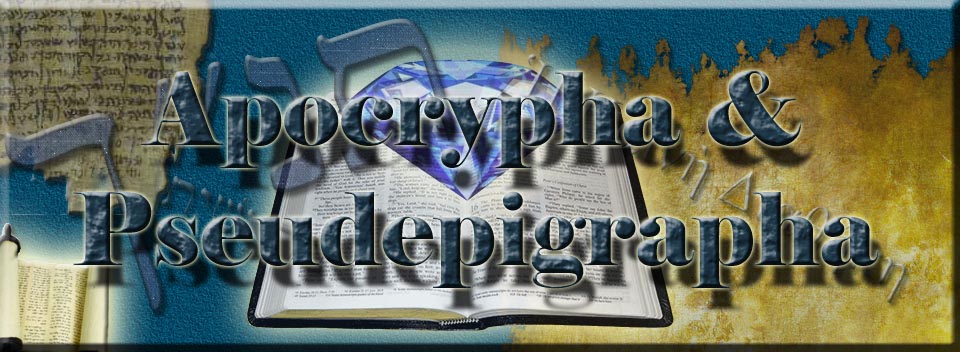
New Testament
Apocrypha* & Pseudepigrapha**
Also Known As The Noncanonical Literature***
The Gospel of the EgyptiansThe following selection is excerpted from Montague Rhode James in The Apocryphal New Testament (Oxford: Clarendon Press 1924), pp. 10-12. Origen, in his first Homily on Luke, speaks of those who 'took in hand' or 'attempted' to write gospels (as Luke says in his prologue). These, he says, came to the task rashly, without the needful gifts of grace, unlike Matthew, Mark, John, and Luke himself. Such were those who composed the Gospel entitled 'of the Twelve'. Apart from this there are but few mentions of the book. A series of passages from Clement of Alexandria is our chief source of knowledge. They are as follows: Clem. Alex. Strom. iii. 9. 64. Whence it is with reason that after the Word had told about the End, Salome saith: Until when shall men continue to die? (Now, the Scripture speaks of man in two senses, the one that is seen, and the soul: and again, of him that is in a state of salvation, and him that is not: and sin is called the death of the soul) and it is advisedly that the Lord makes an answer: So long as women bear children. 66. And why do not they who walk by anything rather than the true rule of the Gospel go on to quote the rest of that which was said to Salome: for when she had said, 'I have done well, then, in not bearing children?' (as if childbearing were not the right thing to accept) the Lord answers and says: Every plant eat thou, but that which hath bitterness eat not. iii. 13. 92. When Salome inquired when the things concerning which she asked should be known, the Lord said: When ye have trampled on the garment of shame, and when the two become one and the male with the female is neither male nor female. In the first place, then, we have not this saying in the four Gospels that have been delivered to us, but in that according to the Egyptians. (The so-called Second Epistle of Clement has this, in a slightly different form, c. xii. 2: For the Lord himself being asked by some one when his kingdom should come, said: When the two shall be one, and the outside (that which is without) as the inside (that which is within), and themale with the female neither male nor female.) There are allusions to the saying in the Apocryphal Acts, see pp. 335, 429, 450. iii. 6. 45. The Lord said to Salome when she inquired: How long shall death prevail? 'As long as ye women bera children', not because life is an ill, and the creation evil: but as showing the sequence of nature: for in all cases birth is followed by decay. Excerpts from Theodotus, 67. And when the Saviour says to Salome that there shall be death as long as women bear children, he did not say it as abusing birth, for that is necessary for the salvation of believers. Strom. iii. 9. 63. But those who set themselves against God's creation because of continence, which has a fair-sounding name, quote also those words which were spoken to Salome, of which I made mention before. They are contained, I think (or I take it) in the Gospel according to the Egyptians. For they say that 'the Savior himself said: I came to destroy the works of the female'. By female he means lust: by works, birth and decay. Hippolytus against Heresies, v. 7. (The Naassenes) say that the soul is very hard to find and to perceive; for it does not continue in the same fashion or shape or in one emotion so that one can either describe it or comprehend its essence. And they have these various changes of the soul, set forth in the Gospel entitled according to the Egyptians. Epiphanius, Heresy lxii. 2 (Sabellians). Their whole deceit (error) and the strength of it they draw from some apocryphal books, especially from what is called the Egyptian Gospel, to which some have given that name. For in it many suchlike things are recorded (or attributed) as from the person of the Saviour, said in a corner, purporting that he showed his disciples that the same person was Father, Son, and Holy Spirit. All this goes to show that this Gospel was a secondary work with a distinct doctrinal tendency. It resembles later Gnostic books such as the Pistis Sophia in assigning an important role in the dialogues with Christ to the female disciples. |
|
* Apocrypha - (from the Greek word απόκρυφα meaning "those having been hidden away") are texts of uncertain authenticity or writings where the authorship is questioned. These texts may have been used in some churches by were never considered as part of the Bible ** Pseudepigrapha = (from Greek pseudes = "false", "epigraphe" = "inscription") are texts falsely attributed to biblical characters or times. These books were never part of the Bible & were never considered as scripture by the church at any time despite being published under such titles of "The Lost Books of the Bible" or "The Hidden Gospels". The church has always known about them & they were never "Hidden" & could be read at any University or college. There is no deep dark secret here, just publishers trying to make a buck with interesting book titles. *** Noncanonical Literature = Never part of the Canon or Bible. |
-
Site Navigation
 Home
Home What's New
What's New Bible
Bible Photos
Photos Hiking
Hiking E-Books
E-Books Genealogy
Genealogy Profile
Free Plug-ins You May Need
Profile
Free Plug-ins You May Need
 Get Java
Get Java.png) Get Flash
Get Flash Get 7-Zip
Get 7-Zip Get Acrobat Reader
Get Acrobat Reader Get TheWORD
Get TheWORD